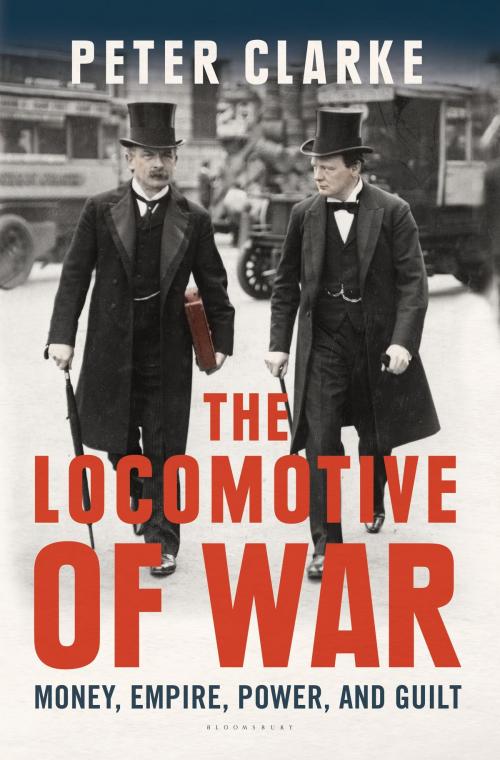The Locomotive of War
Money, Empire, Power, and Guilt
Nonfiction, History, Military, World War I, World War II| Author: | Peter Clarke | ISBN: | 9781620406625 |
| Publisher: | Bloomsbury Publishing | Publication: | July 18, 2017 |
| Imprint: | Bloomsbury Press | Language: | English |
| Author: | Peter Clarke |
| ISBN: | 9781620406625 |
| Publisher: | Bloomsbury Publishing |
| Publication: | July 18, 2017 |
| Imprint: | Bloomsbury Press |
| Language: | English |
An innovative exploration of the origins, impact, and consequences of the First and Second World Wars, from Peter Clarke, one of our foremost historians.
"War is the locomotive of history," claimed Trotsky, a remark often thought to acknowledge the opportunity that the First World War offered the Bolsheviks to seize power in Russia 1917. Here, Peter Clarke broadens the application of this provocative suggestion in order to explore how war, as much as socioeconomic forces or individuals, is the primary mover of history.
Twentieth-century warfare, based on new technologies and vast armies, saw the locomotive power of war heightened to an unprecedented level. Through the unique prism of this vast tragedy, Peter Clarke examines some of the most influential figures of the day, on both sides of the Atlantic. In Britain, David Lloyd George, without the strains of war, would never have become prime minister in 1916; Winston Churchill, except for the war crisis of 1940, would have been unlikely to be recalled to office; and John Maynard Keynes likewise would hardly have seen his own economic ideas and authority so suddenly accepted. In different ways, the shadow of the great nineteenth-century Liberal leader Gladstone hung over these men - as it did also over Woodrow Wilson in the United States, seeing his presidency transformed as he faced new issues of war and peace. And it was Franklin Roosevelt who inherited much of Wilson's unfulfilled agenda, with a second chance to implement it with greater success.
By following the trajectories of these influential lives, Peter Clarke illuminates many crucial issues of the period: not only leadership and the projection of authority, but also military strategy, war finance and the mobilization of the economy in democratic regimes. And the moral dimension of liberalism, with its Gladstonian focus on guilt, is never forgotten. The Locomotive of War is a fascinating examination of the interplay between key figures in the context of unprecedented all-out warfare, with new insight on the dynamics of history in an extraordinary period.
An innovative exploration of the origins, impact, and consequences of the First and Second World Wars, from Peter Clarke, one of our foremost historians.
"War is the locomotive of history," claimed Trotsky, a remark often thought to acknowledge the opportunity that the First World War offered the Bolsheviks to seize power in Russia 1917. Here, Peter Clarke broadens the application of this provocative suggestion in order to explore how war, as much as socioeconomic forces or individuals, is the primary mover of history.
Twentieth-century warfare, based on new technologies and vast armies, saw the locomotive power of war heightened to an unprecedented level. Through the unique prism of this vast tragedy, Peter Clarke examines some of the most influential figures of the day, on both sides of the Atlantic. In Britain, David Lloyd George, without the strains of war, would never have become prime minister in 1916; Winston Churchill, except for the war crisis of 1940, would have been unlikely to be recalled to office; and John Maynard Keynes likewise would hardly have seen his own economic ideas and authority so suddenly accepted. In different ways, the shadow of the great nineteenth-century Liberal leader Gladstone hung over these men - as it did also over Woodrow Wilson in the United States, seeing his presidency transformed as he faced new issues of war and peace. And it was Franklin Roosevelt who inherited much of Wilson's unfulfilled agenda, with a second chance to implement it with greater success.
By following the trajectories of these influential lives, Peter Clarke illuminates many crucial issues of the period: not only leadership and the projection of authority, but also military strategy, war finance and the mobilization of the economy in democratic regimes. And the moral dimension of liberalism, with its Gladstonian focus on guilt, is never forgotten. The Locomotive of War is a fascinating examination of the interplay between key figures in the context of unprecedented all-out warfare, with new insight on the dynamics of history in an extraordinary period.















